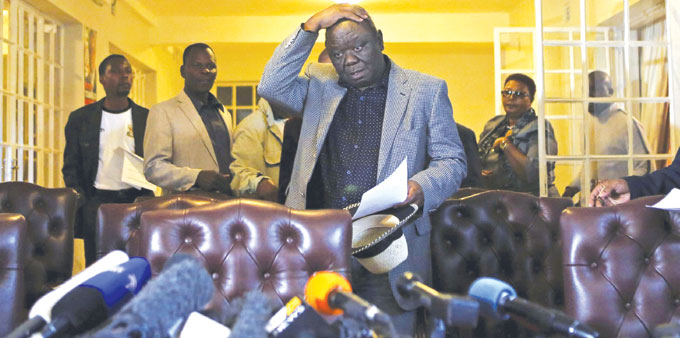|
Zimbabwe’s MDC party, shocked by its overwhelming election defeat, has a battle on its hands to convince supporters it has any chance of taking power in the years to come. |
The Movement for Democratic Change’s survival may depend on a shakeup of its leadership, which many say was naive in entering a four-year unity government with President Robert Mugabe’s ZANU-PF after a decade of acrimony and conflict.
State media are already sounding the death knell for the party led by former trade unionist Morgan Tsvangirai, who since 1999 has been the only man to have offered serious opposition to ZANU-PF - until his hammering in the July 31 polls.
“Morgan Tsvangirai’s 15 minutes of fame have come to a spectacular end. It was bound to happen,” the pro-Mugabe Sunday Mail crowed in an editorial.
As Tsvangirai, 61, prepares to launch a legal challenge to a poll he says was heavily rigged, analysts are asking why his party participated in an exercise it said was riddled with flaws from the outset.
A visibly-angry Tsvangirai told reporters on Saturday he would go to court to overturn the result, which gave ZANU-PF a two-thirds majority in parliament.
Some 61% of voters endorsed the 89-year-old Mugabe for another five-year term as president, against 34% for Tsvangirai, the Zimbabwe Electoral Commission said.
Tsvangirai’s denunciation of the vote as a “huge farce” smacked of desperation by a man “profoundly shocked by having had the rug pulled out from under his feet”, said Piers Pigou of the International Crisis Group, a political think-tank.
“The bottom line is that the MDC formations signed up for this,” he said. “They have been outmanoeuvred again. One could ask what on earth made them think you could trust the process in the first place.”
Tsvangirai and other senior MDC leaders face accusations that they lost touch with the plight of ordinary Zimbabweans while enjoying the perks of being in a unity government formed in 2009 in the aftermath of another disputed election.
The election loss will also re-ignite debate on Tsvangirai’s fitness to continue leading the party, in the wake of a string of sex scandals that called his morals into question.
Over the last five years as prime minister, Tsvangirai has swapped the modest gear he donned at rallies in the party’s fledgling years for sharp suits and gleaming shoes that suggest he is enjoying the same lavish lifestyle as his nemesis.
“Tsvangirai took all his support for granted - that they would never desert him no matter what he did, no matter how badly he behaved,” said political analyst Denford Magora, an outspoken Tsvangirai critic.
“In the end, no matter what accusations of rigging are thrown at ZANU-PF, the truth of the matter is that there is no way out for the MDC this time.”
With African observers largely unanimous in endorsing the elections as free and credible, the MDC will struggle to rally regional support behind it in its bid to overturn the result and pave the way for a re-run.
The party might do well to focus its energies instead on the next elections in 2018, which Mugabe, who has towered over Zimbabwean politics since independence from Britain in 1980, will almost certainly be too old at 94 to contest.
The MDC might learn from the example of Mugabe’s ZANU-PF, which regrouped to revitalise its support base ahead of this year’s poll after narrowly escaping defeat in 2008, said political analyst Eldred Masunungure.
“Presently the MDC is in denial, and justifiably so, but its future depends on what it does once it recovers. It needs to remobilise the people and reconnect with the grassroots,” added Masunungure, a lecturer at the University of Zimbabwe.
“It is high time it tried to rejuvenate the leadership. After this kind of electoral tsunami you can’t rest on your laurels. That would be disastrous.” – Reuters

